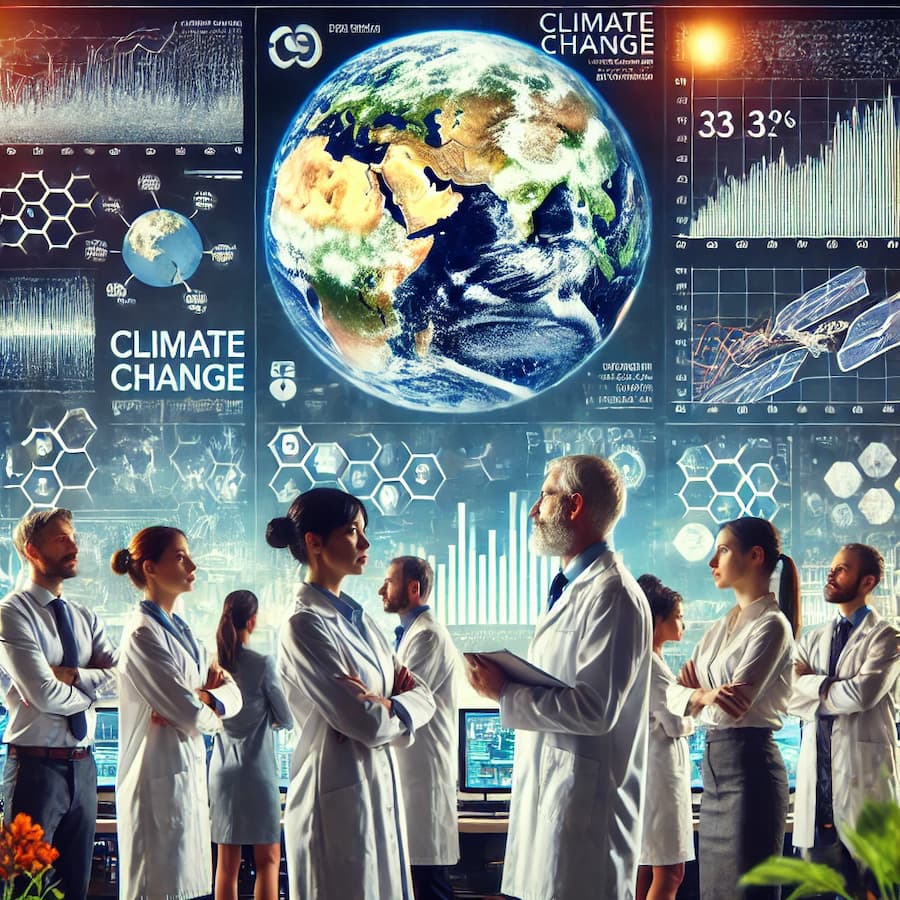What is the Difference Between
Climate Change and Global Warming?
It is important to understand the difference between climate change and global warming in order to avoid confusion. Climate change refers to global warming as well as everything else that increasing greenhouse gases will affect.
In simple terms, climate change is about the change over a long period of time in temperature, precipitation, atmospheric pressure and winds.
On the other hand, global warming, which is not a scientifically correct term, deals solely with the increase in average surface temperatures on a global scale.
Significance
It is important to use the first term since changes in
- precipitation
- wind patterns
- weather
- moisture levels
- and sea levels (among others)
will have a much greater human impact than a rise temperatures alone.
Despite their obvious differences, people tend to use these two terms interchangeably.
Sadly, many skeptics have wrongly stated that the reason scientists are using the term climate change is because of the lack of evidence supporting global warming. This is simply ridiculous.
However, these are but some of the many terms you should know in order to help your use of the Climate Change Guide.
Please consult the climate change glossary to learn more.
More Detailed Explanation: Climate Change and Global Warming
Understanding Climate Change vs. Global Warming: Key Differences Explained
The terms "climate change" and "global warming" are often used interchangeably in discussions about the environment, but they refer to different phenomena. Understanding these differences is crucial for grasping the complexities of our planet’s changing climate and the impacts of human activities on it.
Global Warming Definition:
Global warming specifically refers to the increase in Earth's average surface temperature due to the buildup of greenhouse gases in the atmosphere. The primary greenhouse gases include carbon dioxide (CO₂), methane (CH₄), and nitrous oxide (N₂O). These gases trap heat from the sun, preventing it from escaping back into space, thus warming the planet.
Causes:
The main cause of global warming is human activity, particularly the burning of fossil fuels (coal, oil, and natural gas), deforestation, and industrial processes. These activities release large amounts of greenhouse gases, enhancing the natural greenhouse effect.
Impacts:
The impacts of global warming are significant and far-reaching. They include:
- Increased global temperatures
- Melting polar ice caps and glaciers
- Rising sea levels
- More frequent and severe heatwaves
- Changes in precipitation patterns, leading to droughts and floods
Key Example:
The Intergovernmental Panel on Climate Change (IPCC) reports that the Earth's average temperature has increased by about 1.2°C since the late 19th century, with most of this warming occurring in the past few decades【49†source】.
Climate Change Definition:
Climate change encompasses a broader range of changes occurring in the Earth’s climate system. While it includes global warming, it also refers to other long-term changes in temperature, precipitation, wind patterns, and other aspects of the Earth's climate.
Causes:
In addition to the causes of global warming, climate change can be driven by natural factors such as volcanic eruptions, variations in solar radiation, and changes in the Earth's orbit. However, recent climate change is predominantly due to human activities.
Impacts:
The impacts of climate change are more varied than those of global warming and include:
- Shifts in weather patterns, leading to more intense and unpredictable storms
- Ocean acidification due to increased CO₂ levels, affecting marine life
- Altered ecosystems and wildlife habitats, leading to shifts in species distribution and behavior
- Changes in agricultural productivity, impacting food security
- Increased frequency of extreme weather events such as hurricanes, typhoons, and tornadoes
Key Example:
Climate change has led to observable effects such as longer growing seasons, shifts in plant and animal ranges, and earlier onset of spring events like snowmelt and flowering in many regions【49†source】.
Distinguishing Between the Two
While global warming refers specifically to the rise in global temperatures, climate change includes this warming but also covers a wider range of changes in the climate system. This distinction is important for scientific clarity and for effective communication about the different facets of the Earth's changing environment.
Scientific and Policy Context:
- Global Warming: Used more in the context of the temperature increase itself and its direct effects.
- Climate Change: Used in scientific, policy-making, and public discussions to describe the broader changes and impacts on natural and human systems.
Conclusion:
Understanding the difference between climate change and global warming helps in comprehending the full scope of the environmental challenges we face. While global warming is a key driver of the broader climate changes, addressing climate change requires a comprehensive approach that includes mitigation of greenhouse gas emissions and adaptation to the various impacts on ecosystems and human societies.
By clearly distinguishing between these terms, we can better appreciate the complexity of the Earth's climate system and the urgent need for concerted global action to address the multifaceted challenges posed by a warming planet.
ChatGPT was used to help create this article
Further Reading and Sources
Search a Term

Further Reading and Sources
Join the Community and Newsletter (5000 Subscribers)
You can subscribe to my Substack Page or see the archives of previous posts. More great content coming soon!
Go Solar!
If you live in the United States and want to go solar, now is your chance! Visit Powur
Also, more importantly, you could become an ambassador for Powur and earn $1000 per successful referral. This is a fantastic opportunity to help the environment by helping your bottom line.
You even have the opportunity to become a solar professional, which takes it a step further. Do this if you want to really work in the solar industry. After going through a training, you can earn on average between $2000 to $4000 USD per panel installed. You don't have to be an American to be a solar professional for Powur, but it makes it a lot easier.
Recent Articles
-
Climate Change Quotes by Scientists Around the World
Aug 24, 24 02:01 PM
Explore impactful climate change quotes by scientists. Discover the wisdom and insights of experts advocating for a sustainable future. -
The Blueprint for a Smart and More Sustainable Home
Aug 21, 24 09:57 AM
These days, the concept of “home” has evolved to encompass more than just a physical space, reflecting one’s values, as well. As concerns over environmental -
Green Steps: Practical Measures for Overcoming Climate Change Anxiety
Aug 01, 24 12:46 PM
Climate anxiety affects many people today, and taking definitive action can soothe these concerns while positively impacting the world. By educating yourself -
8 Steps to Launching a Green Building Business
Jul 10, 24 09:13 PM
Have you been thinking about starting your own green building business? If so, you’ve come to the right place. In this blog post, we’ll go over everything
Powur - Solar Power at your Fingertips
Earn $1000 per referral by becoming an ambassador for Powur, a great solar power company in the United States.
If you become an ambassador for solar power, you have three incredible incentives:
- Help yourself by earning $1000 each time you successfully refer someone to solar
- Help create a better world for the next generation
- Help fund the Climate Change Guide, which will continue to spread awareness about climate change. We have been spreading awareness since 2011 to millions of people from nearly 200 countries.
Moreover, you can become a solar professional like me by joining Powur. Take your Powur back!



